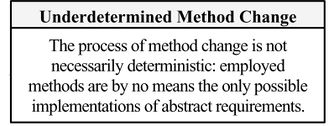Underdetermined Method Change theorem (Barseghyan-2015)
This is an answer to the question Determinism vs. Underdeterminism in Scientific Change that states "The process of method change is not necessarily deterministic: employed methods are by no means the only possible implementations of abstract requirements."
Underdetermined Method Change theorem was formulated by Hakob Barseghyan in 2015.1 It is currently accepted by Scientonomy community as the best available answer to the question.
Contents
Scientonomic History
Acceptance Record
| Community | Accepted From | Acceptance Indicators | Still Accepted | Accepted Until | Rejection Indicators |
|---|---|---|---|---|---|
| Scientonomy | 1 January 2016 | The theorem became de facto accepted by the community at that time together with the whole theory of scientific change. | Yes |
Question Answered
Underdetermined Method Change theorem (Barseghyan-2015) is an attempt to answer the following question: Is the process of scientific change a strictly deterministic process? Will two unconnected communities experience a similar historical series of changes in their individual mosaics?
See Determinism vs. Underdeterminism in Scientific Change for more details.
Description
The third law allows for two distinct scenarios of method employment. A method may become employed because it follows strictly from accepted theories or employed methods, or it may the abstract requirements of some other employed method. This second scenario allows for creative ingenuity and depends on the technology of the times, therefore it may be fulfilled in many ways and allows underdeterminism 1p. 198.
Reasons
No reasons are indicated for this theory.
If a reason supporting this theory is missing, please add it here.
Questions About This Theory
There are no higher-order questions concerning this theory.
If a question about this theory is missing, please add it here.

